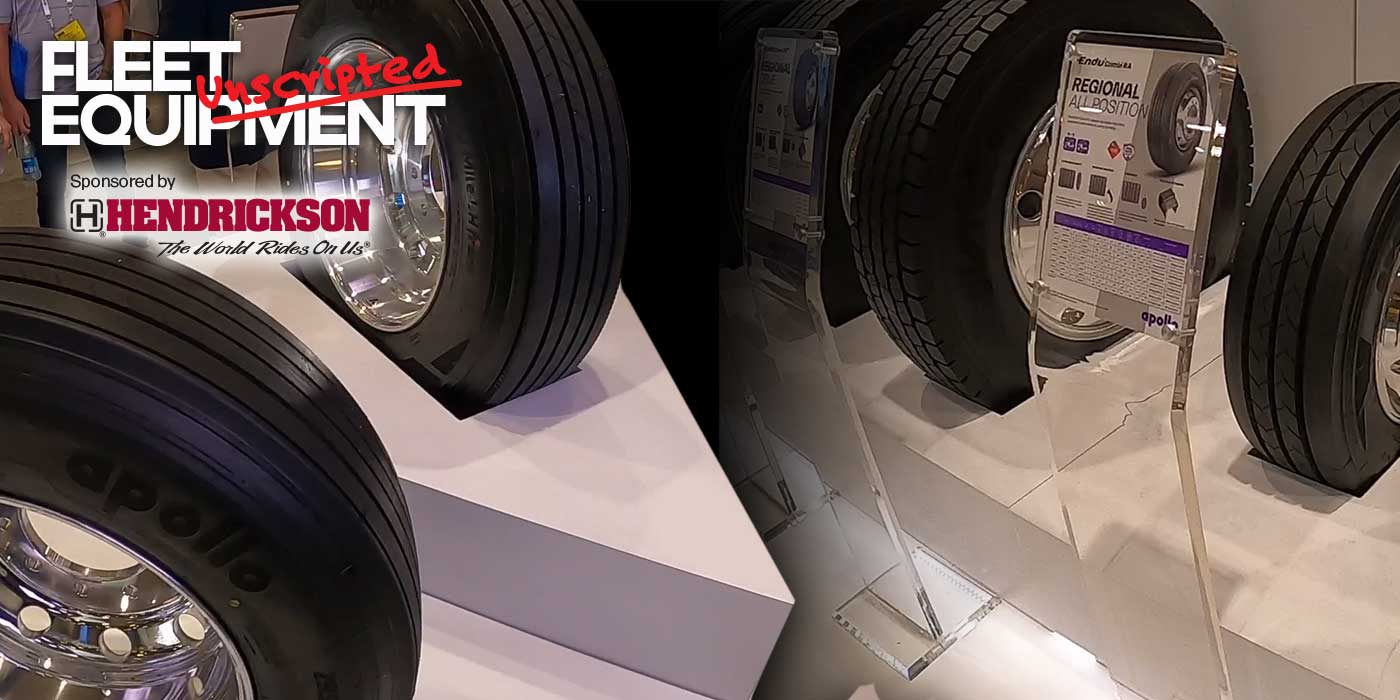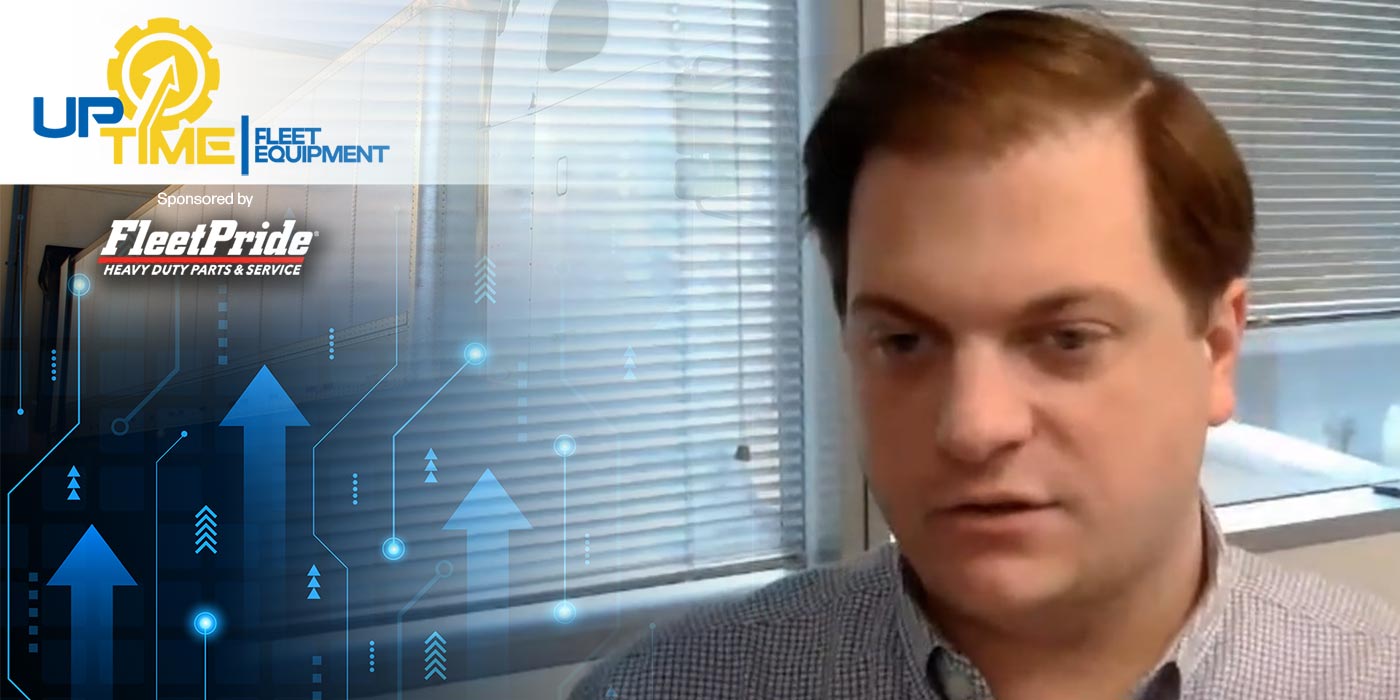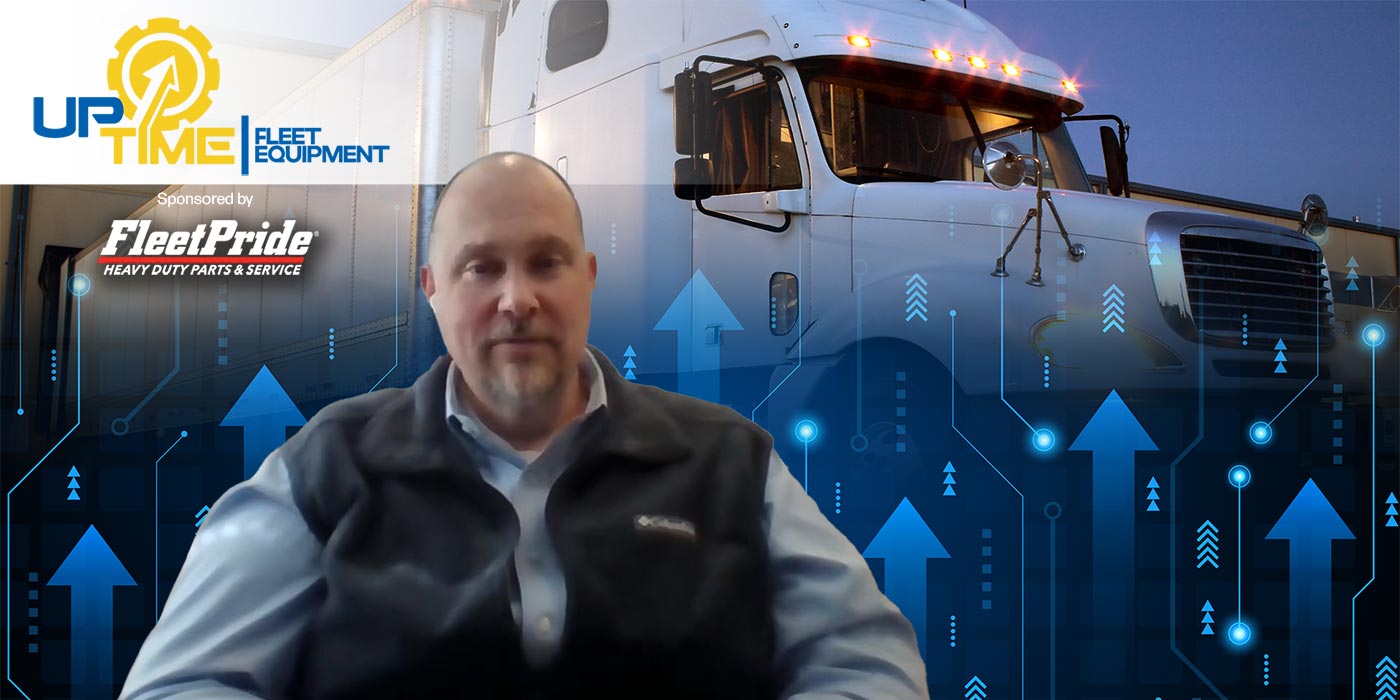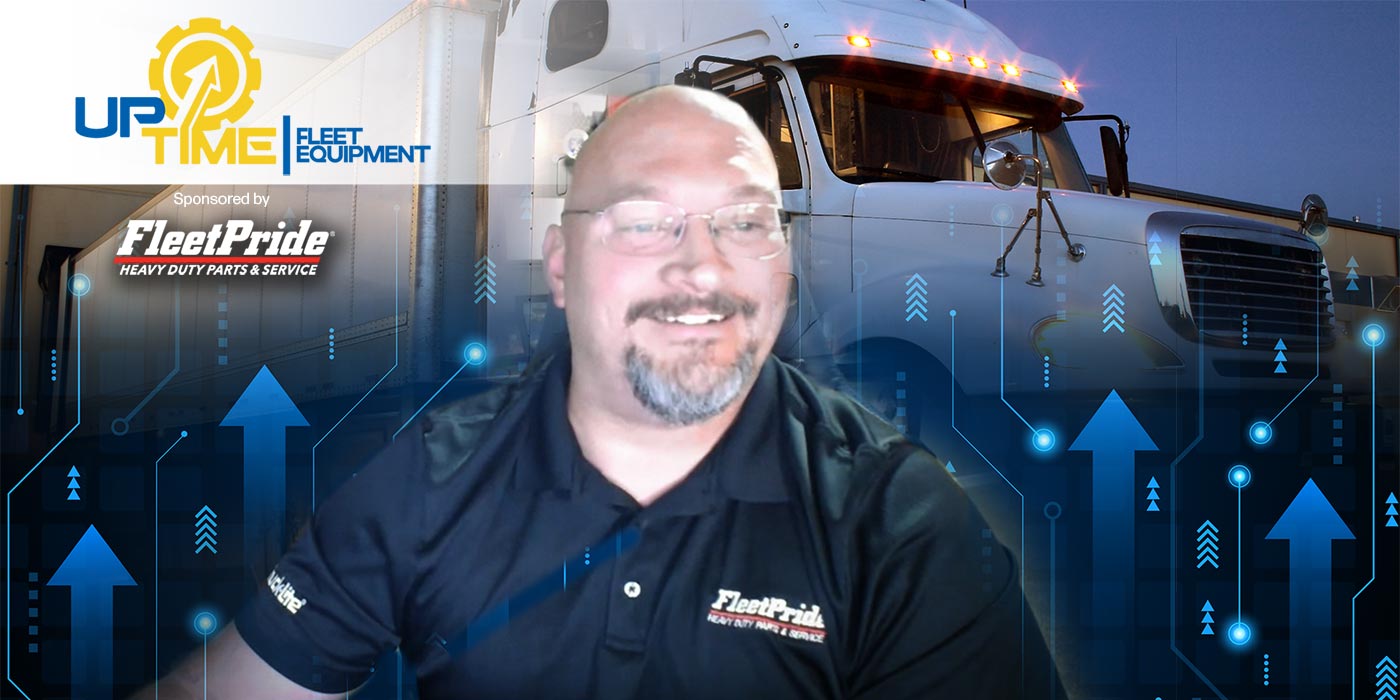If you want to maximize uptime, you have to keep your trucks moving. That means anticipating maintenance issues before they happen, and after driving through an oh-too-long season full of harsh winter weather and snow-melting chemicals, there’s no better time to put your trucks under the microscope than the weeks leading up to spring. Better to spend $300 today to avoid an issue that down the road could cost your fleet thousands.
On this episode of Fleet Uptime, we get in touch with Chris Coleman, area manager of southeast service at FleetPride, and James Winton, director of category management at FleetPride, to learn some of their top truck maintenance tips, how to battle corrosion and what moving back PM intervals can mean for your bottom line.
Looking for more Fleet Uptime? Click here.
Here’s a transcript of the show:
David Sickels: Hello and welcome to Fleet Uptime – another opportunity for us to talk about best practices in technology, truck parts and service to help you maximize equipment, uptime and profitability. My name’s David from Fleet Equipment and today, yes, I know there’s a decent chance it’s still snowing in your part of the country, but it’s never too early to talk about spring maintenance. Spring is just around the corner, and winter can take quite a toll on your trucks if you don’t look out for them.
In an effort to maximize Uptime, I think it’s the perfect time to talk with two masters of uptime over at FleetPride about their go-to spring maintenance tips. Chris Coleman, area manager of southeast service at FleetPride, and James Winton, director of category management at FleetPride. Let’s get right to it. Chris, James, thank you both for joining me today. I really appreciate it. And we’re talking about maintenance today. So Chris, let’s start with you. Tell us a little bit about your background and why we can trust you as a maintenance expert.
Chris Coleman: Hey Dave, thanks for having us on. Again, my name’s Chris Coleman. I’m the southeast area manager for FleetPride. I’ve been in the transportation business now for about 31 years. I’ve worked on trucks, trailers, heavy equipment, the whole nine yards.
David Sickels: James, what about you?
James Winton: Thanks for having me, David. James Winton, director of category management here at FleetPride. Been in the aftermarket parts business for 30-plus years, whether it’s light-duty all the way up to heavy-duty. I’ve been around vehicles my entire life, so got a lot to share.
David Sickels: Well, that’ll come in handy today because we were talking about just before we started this podcast today, how we’re seeing fluctuating temperatures all over the country right now. I think it’s 65 degrees here in Akron, Ohio where I am, and it’s the middle of February, so that’s extremely uncommon. We have these fluctuating temperatures. What does that mean for truck service? What are some of the standout service needs that you are seeing as we move from winter to spring, or as we’re having these extreme variations in temperature? Chris, let’s start with you.
Chris Coleman: Going from the winter weather that we’ve had when everything’s cool and everything’s kind of meshing together, going in over into the spring and summer, the cooling system is probably one of the biggest challenges we see with trucks. It is the time of year now to check your belts, hoses, your belt tensioners. Make sure your radiators are flushed out. Driving through all the salt and the snow of the wintertime, it all gets in your radiator, clogs it up and reduces your cooling capacity.
David Sickels: Absolutely. James, do you have anything to add there?
James Winton: No, I think Chris is right on point there. It’s really a little bit of preventive maintenance from the wear and tear of the winter that will go a long way as you get into the heat of summer.
David Sickels: Absolutely. Chris, how does this differ as we’re talking about heavy-duty trucks as opposed to maybe a vocational medium-duty truck or something light-duty? Is there a difference that we’re looking at there?
Chris Coleman: Yeah, it’s all the same mechanical parts. I mean, they all have the same reactions with hot and cold and run in the same environments.
David Sickels: James, what HVAC-related wear and tear do we need to look out for as we’re moving from winter to spring?
James Winton: HVAC really isn’t a preventive maintenance type of category, but as you think about it from either a technician’s perspective or a driver’s perspective, you want to make sure the condenser, like the radiator, is clear of debris.
You want to make sure there’s no dust and dirt there. Look for leaks. Obviously, if the AC lines have oil buildup and dirt buildup, that’s a sign of a leak and that should get fixed right away. And then, yeah, I think the cabin air filter is probably one that most people don’t even think about. But vehicles that are in more severe environments tend to get more dust and dirt in the cabin air filter, which restricts airflow and reduces the efficiency of the AC system. So those are the main things that outside of the temperature is not as cold as I’d like it to be, and over time that happens and that’s a sign of low refrigerant and it needs to be addressed.
David Sickels: When you’re talking about that cabin air filter or filters in general, is there a regular interval that you suggest checking on those to ensure that they’re working properly, or is that something more that once you feel it or once you suspect something might be wrong that’s the time to look at it?
James Winton: I would say, and Chris can probably jump on this too, but I would say from a cabin air filter perspective, whenever you’re changing the air filter, you should absolutely change the cabin air filter, more frequently if you’re in a dusty or dirty environment, or as Chris educated me on last week if you have pets in your cab and you’re getting pet hair through the cab air filter, it’s no different than your house filter at home.
The more dirt and debris that’s there it’s going to decrease airflow, and you want to make sure it’s clean and clear. Also, you’re breathing in those particles too, right? So you want to make sure you get them cleaned out.
Chris Coleman: Yeah, totally agree with that. And if any of the vocational type trucks, dump trucks, heavy haul type trucks, or off-road construction type trucks, you may have to do that in between services as well.
David Sickels: That absolutely makes sense, especially for a lot of those vocational applications where you’re driving off-road or in dusty environments for sure. Is there anything that drivers can be doing to help the fleet maintain that HVAC system throughout the year?
James Winton: I think it’s just awareness when they see an issue. Notify somebody right away because that can go downhill pretty fast. As I talked about those leaks, blower motor rattles. But I think for the most part it’s just regular maintenance on the vehicle. Obviously, vibration is really hard on these systems, so the location will really demand more frequent conversation on how the system operates.
David Sickels: Chris, corrosion is obviously a huge truck killer in a lot of parts of the country, especially where there’s a lot of salt being laid down on the roads, things like that. What can these fleets be doing to help prevent that damage as they’re sending their trucks out?
Chris Coleman: David, just short of moving to Phoenix, Arizona where you don’t have to deal with it, there’s not a lot of things that are proven to take care of the corrosion. Ultimately washing the truck. When you go into say a snow event and salt and brine has been placed down on the road, washing that off. I mean, are you going to get all of it off? Probably not, but it’s going to help the situation.
If your fleet is in that area, there are companies out there that do what they call an oiling. And then they spray a light film of oil under the truck on the axles, things of that nature. Obviously, it’s clean when they do it, and then that oil keeps the salt from intrusion in little cracks and crevices. But just a constant washing of getting the salt off the truck. Or there’s moving to Phoenix, Arizona, whichever one works best.
David Sickels: Hey, if that works for you, then that sounds like a great solution. When you say a constant washing, are you saying if I send my truck out during the day and there happens to be salt on the road that night, I need to be washing it?
Chris Coleman: Not necessarily that often. But, I mean, obviously, during a snow event, it doesn’t go on for months on end typically. So once that event’s gone and the salt has had a chance to wash off the road, then wash your truck. That way it’s just not stuck up under the truck.
David Sickels: So we’ve heard a lot of reports about fleets maybe deferring their PMs because of whatever reason it might be. Maybe they are having trouble finding parts or their financial situation just isn’t great at this time. Is this a good idea, for whatever reason, if you don’t feel like you can either afford that maintenance right now or, I mean, basically what I’m asking is are they going to end up paying more in the long run for deferring that maintenance, or do they really need to be sticking to this schedule?
Chris Coleman: It is something that if you stay on a consistent maintenance schedule and you’re looking at the truck, you’re seeing the problems with the truck. If you start pushing your maintenance out and you’re not looking at the truck regularly, what could be a $300 or $400 repair could turn into a $3,000, $4,000, $5,000 repair.
And not only that part of it, but it gets to even going through scale houses and DOT inspections. If you had done a regular PM, you may have caught a blown wheel seal or low brakes or an air leak or something of that nature. So you didn’t do the PM, you didn’t catch it, and now you’re at the scale house going through an inspection and they put you out of service. Now you’re having to call a road service to make the same repair you would’ve made in your shop to start with.
David Sickels: James, how would deferring preventative maintenance possibly affect the HVAC system of a truck?
James Winton: Again, I don’t know that there is necessarily a preventive maintenance plan for HVAC, but I think it’s more just the visual cues, right? If you’ve got an oil leak, you’ve got a problem. Oil leaks will tend to lead down the road to oil starvation of the compressor, the compressor will fail, then it becomes a very costly replacement because you have to replace all the parts and do all the flushing. Getting it ahead of time, getting it ahead of failure, and being able to fix those oil leaks will save you a tremendous amount of money, time, and downtime down the road for sure.
David Sickels: If you wanted to maybe Chris defer only until the weather gets a little bit nicer, do you think that would be a big deal? Perhaps you’re only skipping your preventative maintenance cycle during the wintertime.
Chris Coleman: I don’t think that it’s a great idea just for the simple fact of things failing, wheel seals, brake issues. I mean, you could have a U joint go out. Even the fact of cooling leaks, oil leaks, things of that nature that may be the driver’s not picking up on or not catching or whatever, and it just leads into larger problems going down the road.
James Winton: I’ll add David. I think depending on what your cycle is, you’re getting a trained eye on the truck. They might find something else that nobody else is even thinking about that isn’t even in the cycle right now, but it can get fixed.
Chris Coleman: I mean, they’re 20,000 to 25,000 miles out on PM services, some even higher. So if you push that 25,000-mile service out any further, I mean you’re getting up into some big mileage. Somebody has not had their eyes on the truck.
David Sickels: Yeah, absolutely. I mean, even with my just personal consumer vehicle, I’m at least getting my oil changed every 5,000 miles or so. And James, to your point, I’m getting a professional whose eyes are on that vehicle at that time and they can tell me, “Hey, you’ve got X, Y, Z, also wrong.” Maybe I need an alignment or something and they can alert me to that. Something that I might not have noticed on my own. So that’s a really great point. 25,000 miles, that’s a long way to wait. Pushing that out any further could be pretty detrimental for sure. Chris, I wanted to ask you about the international road check. It happens every year and every year, 100s or 1000s of vehicles are taken off the road because of maybe it’s brakes or tire violations. So how could this have been prevented through maintenance?
Chris Coleman: With regularly scheduled maintenance. Getting a professional eye to look at the truck. Fixing things before they become a huge issue. Instead of having out-of-service brakes, go ahead and change the brakes before they hit that mark and it keeps you from getting shut down and having costly on-the-road repairs.
That’s going to be the major thing that any fleet could do to avoid getting in trouble during that audit time.
David Sickels: Absolutely. Yeah, that could go a long way for truck Uptime for sure.
Chris Coleman: Any of the fleets or owner-operators listening can always go to fleetpride.com/deals and see what kind of deals FleetPride has going on. Because during the months prior to the International Roadcheck, we will offer an inspection at a discounted rate.
David Sickels: That’s great to know. Thank you. Well, Chris, James, I really appreciate your time here today. Thank you for joining me. I think our audience is going to get a lot out of your tips and your insight for maximizing uptime through maintenance. Really appreciate it.













